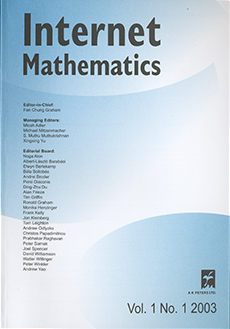Abstract
Caching data together with expiration times beyond which the data are no longer valid is a standard method for promoting information coherence in distributed systems, including the Internet, the World Wide Web (WWW), and Peer-to-Peer (P2P) networks. We use the framework of competitive analysis of online algorithms and study upper and lower bounds for page eviction strategies in the case where data have expiration times. We show that minimal adaptations of marking algorithms achieve performance similar to that of the well-studied case of caching without the expiration time constraint. Marking algorithms include the widely-used Least Recently Used (LRU) eviction policy. In practice, when data have expiration times, the LRU eviction policy is used widely, often without any consideration of expiration times. Our results explain and justify this standard practice.
Citation
Parikshit Gopalan. Howard Karloff. Aranyak Mehta. Milena Mihail. Nisheeth Vishnoi. "Caching with Expiration Times for Internet Applications." Internet Math. 2 (2) 165 - 184, 2005.
Information




